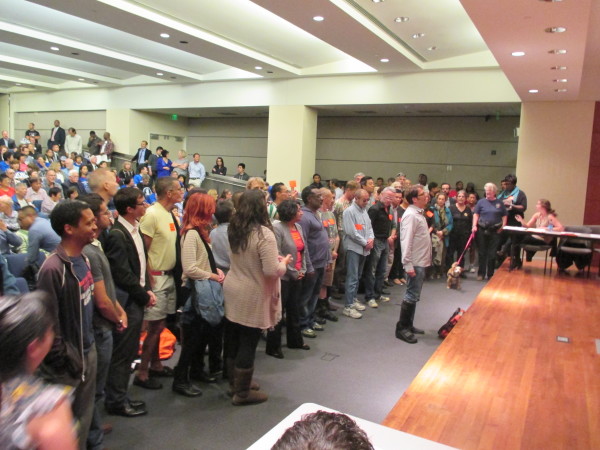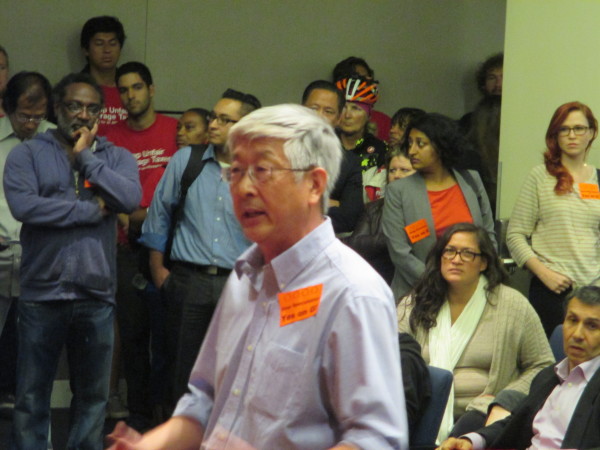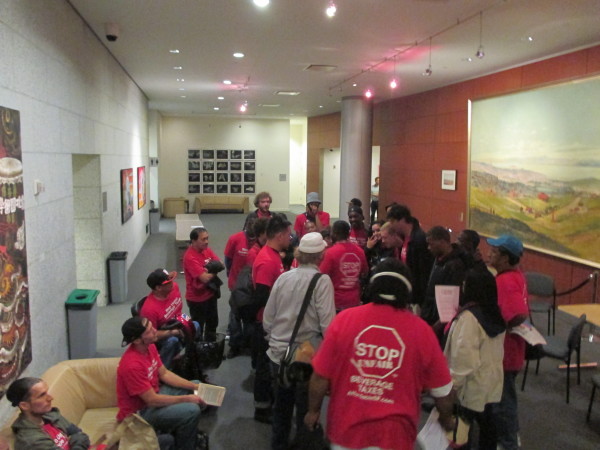
By Tim Redmond
AUGUST 14, 2014 — The biggest applause at the Democratic County Central Committee last night came about an hour and a half into the meeting, when Chair Mary Jung announced that “public comment is closed.”
Half the audience was already exhausted. The basement room at the state building was not only packed but airless and about 90 degrees. A long list of speakers supported or opposed candidates and ballot measures – but for the most part, the deals were already cut. And everyone who was left after the speeches were over wanted to know how the votes would come down.
And almost two hours later, the Democratic Party of San Francisco endorsed Prop. G, the anti-speculation tax, by a narrow two-vote margin.
“This was huge,” Gen Fujioka, a longtime tenant leader, said.
Sup. David Chiu, who tenant advocates feared would vote against the measure, wound up supporting it. If he’d come down against the endorsement, it would have given his Assembly opponent, Sup. David Campos, a huge issue to motivate the renter vote.
Sup. Malia Cohen, who tenants couldn’t count in the Yes column, passed on the first round to count the votes, and in the end abstained – a good result, since at the DCCC abstentions lower the number of votes needed for endorsement.
There are 32 members of the panel, meaning Prop. G needed 17 votes – but with Cohen, Assemblymember Phil Ting, and Rep. Nancy Pelosi abstaining, the magic number dropped to 15. Which the tenants just managed to pull off.
It would have looked terrible for the Democratic Party of SF to side with the landlords, particularly since the party chair, Mary Jung, is employed by the Association of Realtors.

Fujioka, who works with the Chinatown Community Development Center, made the case when he addressed the panel. He noted that city officials had already tried to change state law to limit Ellis Act evictions – and the state Legislature had turned the city down. There’s nothing left now but local rules – and charging speculators a hefty fee for flipping buildings could go a long way to protect affordable housing.
A group called the Small Property Owners of San Francisco appeared in blue shirts to oppose the measure, and Josephine Zhao, one of the leaders, told the panel that many of her group’s members had owned their property for many years. That was an odd argument, since people who have owned their property more than five years won’t pay a penny in additional tax if they sell it.

The DCCC also endorsed the sugary drinks tax, fairly handily. A crew of red-shirted opponents showed up, but all of them had left by the time the vote was taken.
The room was packed, and a long line of people waited outside to get through security.
The biggest debate on the panel didn’t involve the ballot measures. The DCCC was split over what to do about the BART Board race that pits Democrat Nicholas Josefowitz, who runs a solar-energy company, against Republican James Fang.
The Democratic Party clearly can’t endorse a Republican – but an unusual coalition of Fang supporters denied Josefowitz the party nod.
Members Alix Rosenthal and Matt Dorsey both argued forcefully that a credible Democrat was running, and that the party had a responsibility to support him. “This race more than any will let me know whether I can tell the people who voted for me that I am doing the job,” Dorsey said.
But Rafael Mandelman raised an issue that has often divided this body.
“For some of us, the Democratic Party is a means to an end, to promote social and economic justice, and not an end in itself,” he said.
And in this case, the BART unions, including SEIU Local 1021, which is one of the most progressive labor groups in the state, was supporting Fang in the nonpartisan race – because he was the only BART Board member to stand with the workers in the recent strike.
Fang is a rare GOP member in San Francisco, but his family has long ties to the Democratic establishment, particularly Sen. Dianne Feinstein and Rep. Nancy Pelosi.
Feinstein and Pelosi send proxies to the DCCC who rarely vote with the progressives. In this case, the party heavies joined labor allies, leaving 17 votes for a No Endorsement position.
The Party Heavies sided with Sup. Malia Cohen in her re-election effort, denying even a second-place slot for challenger Tony Kelly.
Cohen voted for herself. Sup. Scott Wiener also voted for himself. Not that it matters, since they were winning handily anyway, but one could certainly argue that the candidates have a direct financial interest in the outcome of their own endorsement, and could have recused themselves.
So a loss for the challenger in D 10, but a win for tenants: Chiu’s decision to support Prop. G, and Cohen’s decision not to oppose it, both indicate how important the renter vote will be this fall, not just on this ballot measure but in every contested election in the city.




